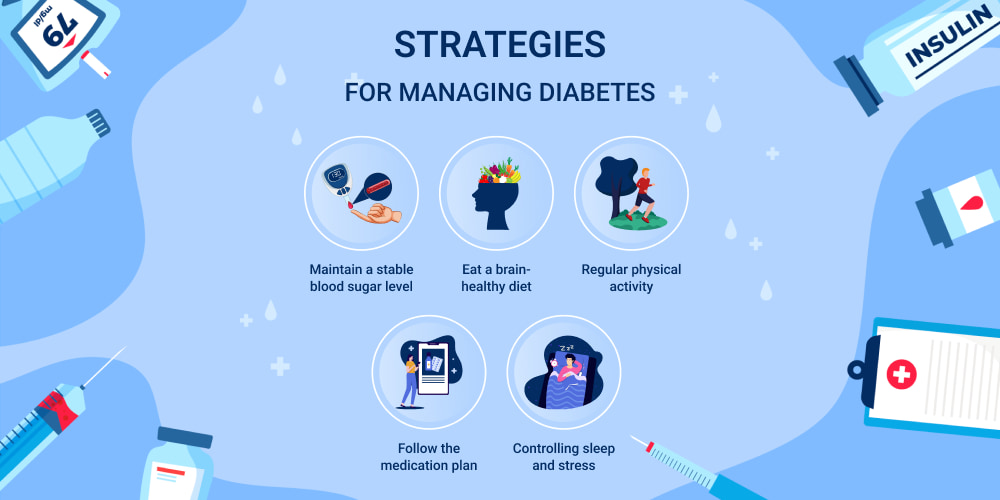In the modern world, medicine is evolving and trying to provide treatment for everyone. Among the many diseases that affect health, it is essential to understand how to treat them. Diabetes is a severe disease that affects a person’s general condition. It often affects many organs and has an impact on neurology. Timely treatment can prevent the onset of this disease. A managed disease leads to better health outcomes and allows a person to live a full life.
A serious complication is neuropathy, which occurs during high blood sugar. During long-term exposure, it damages nerves throughout the human body. The patient may often experience various pains, numbness, and loss of sensation. Severe cases affect autonomic functions. Another profound impact of advanced diabetes is cognitive impairment. A person is at risk of developing neurological diseases. By understanding the causes and consequences, it is possible to conduct a course of treatment.
How Diabetes Affects the Nervous System
Due to high sugar levels, the disease has a negative effect on the nervous system. It damages their function and prevents a person from living a whole life. Over time, a person notices neurological disorders that provoke serious illnesses. Everyone knows the nervous system consists of the peripheral and autonomic nervous systems. These two parts are seriously affected by the disease during long-term exposure.
- A serious consequence of this disease is neuropathy that occurs during the constant action of hyperglycemia. Long-term exposure can cause negative disturbances in the human nervous system. Oxidative stress and inflammation occur, which leads to nerve damage.
- The effect of diabetes on the autonomic nervous system is profound. There are changes in blood pressure and heart rate. Constant exposure can cause dizziness and dysregulation of the heart rhythm. A person suffers from poor health and cannot live a full life.
A prolonged state of high blood sugar is dangerous. It is essential to see a doctor in time and get help. LoneStarNeurology offers comprehensive care for people with neurological conditions. Maintaining a stable glucose level, diet, and exercise are helpful. Equally important is glycemic control, which is done on an ongoing basis to preserve nerve function.
Neuropathy: A Common Complication of Diabetes
One of the most common complications of the disease is diabetic neuropathy. It is hazardous and is develops from high blood sugar levels for a long time. It has a significant impact on the peripheral and autonomic nervous system. During long-term exposure, a person loses motor skills and sensory perception and cannot live a full life. Here are the main types of neuropathy and their symptoms:
- Peripheral. It is considered the most common type affecting the feet, hands, and arms. Usually, the symptoms of this type include numbness in the fingers or toes or even decreased sensitivity. A person may feel a sharp pain or a burning sensation at any time. The person often loses balance and is at increased risk of falling. It causes neurological disorders that become an obstacle to everyday life.
- Autonomic Neuropathy. It affects the nerves and disrupts the function of the cardiovascular system. A person may experience an irregular pulse, low blood pressure, and dizziness. Often, a person has problems with the gastrointestinal tract, such as nausea or diarrhea. It has a profound impact on the occurrence of urinary tract infections.
- Proximal. Proximal neuropathy affects the nerves in the thigh or buttocks. Often, a person feels constant weakness and pain in the legs. It is difficult for them to get up after sitting or climbing stairs. Over time, a person may lose muscle strength and function.
Early detection of this disease is essential for human health. Regular nerve function tests and screenings are the best way for doctors to detect and prevent the disease and prescribe individualized treatment. Glycemic control is an integral part of health management. People with this disease can reduce the risk of complications and protect themselves.
Cognitive Impairment and Diabetes: The Silent Threat
Diabetes is closely linked to various complications and nerve damage. However, it also has a significant impact on brain health. The disease can have serious consequences for cognitive health. A person is at greater risk of dementia, Alzheimer’s disease, or vascular decline. Here is the primary information about the impact of the disease on cognitive abilities:
- Brain damage. High blood sugar for a long time leads to inflammation. Oxidative stress and brain cell damage can occur in the body. Long-term exposure to the disease can lead to cognitive impairment.
- Insulin resistance. The brain relies on insulin to regulate cognitive function. Insulin resistance is formed when memory formation is impaired. As a result, a person suffers from cognitive decline and brain damage.
- Vascular damage. Diabetes has a profound impact on the narrowing of blood vessels. The brain and body do not receive enough oxygen from the blood. There is a high risk of vascular dementia and brain tissue damage.
- Hypoglycemia. The long-term effect of low blood sugar causes confusion. A person experiences memory lapses and cannot concentrate fully. Severe hypoglycemia can severely damage the brain and its functions.
Diabetes is closely related to dementia and its development. The combination of low glucose and vascular complications causes dementia. Chronic inflammation in the brain also contributes to neurodegenerative diseases. To protect your condition and cognitive health, it is important to maintain stable blood sugar levels. It is essential to maintain a healthy diet and consume healthy fats and antioxidants. Don’t forget to maintain mental activity, read, and be socially involved. It is important to take care of your body and your health to avoid cognitive impairment.
The Impact of Glycemic Control on Neurological Health
Continuous glycemic control is the most effective way to protect neurological health. Health is the most essential thing in life. Chronic hyperglycemia can cause long-term damage to the nervous system. Over time, a person experiences pain and can develop serious illnesses. Control prevents complications and helps manage the condition. Here’s how glycemic control protects the nervous system:
- Keeping glucose levels stable helps prevent inflammation and oxidative stress.
- The disease causes insulin resistance in the brain and an increased risk of neurodegenerative diseases. Constant monitoring helps to maintain cognitive abilities and a cognitive function.
- Continuous monitoring helps to minimize vascular damage and improve blood circulation. Control reduces the risk of strokes and brain atrophy.
- Control helps to avoid neuropathy and severe damage.
For complete control, it is essential to maintain all recommended management strategies. They will help you enjoy life to the fullest and maintain your health. Here is their main characteristic:
- Always monitor your blood sugar. Constant monitoring will help prevent extreme and serious complications.
- Always prioritize foods with a low glycemic index. Eat healthy fats, vegetables, and fiber.
- For proper glycemic control, do not forget about physical activity, depending on your condition.
- Use medications prescribed by your healthcare provider. They will help maintain your body and your health.
- Equally important is a good quality stress-free sleep with meditation. Create a sleep schedule and try to sleep in a cool room.
Strategies for Managing Diabetes and Preventing Neurological Complications
Good diabetes treatment strategies will have a positive impact on brain health and body health. Effective treatment is essential to prevent neurological disorders. To avoid complications, it is crucial to follow specific rules. Regular medical check-ups and lifestyle changes are the best ways. Here are the main tips for diabetes treatment:
- Maintain a stable blood sugar level. Monitor your glucose levels regularly throughout the day. Avoid extreme blood sugar levels to avoid worsening the situation.
- Eat a brain-healthy diet. Eat whole grain products and lean proteins. Vegetables and fruits rich in fiber will be the best option.
- Regular physical activity. Regular physical activity will help you stay in shape and improve your health. Aerobic exercise improves insulin sensitivity and improves blood circulation. Regular physical activity will help to avoid cognitive impairment.
- Follow the medication plan. Always take your medications as prescribed by your doctor. Use them to avoid raising blood sugar levels. Medication is the best option to prevent complications and neurological disorders.
- Controlling sleep and stress. Always fall asleep in a cool room and sleep for about 8-9 hours. Do not be distracted by blue lights such as TVs or phones. Regular sleep will help maintain your health and brain health.
An integral part of diabetes management is regular visits to your doctors. They can help you perform neurological assessments and identify early signs of damage. You can have your cardiovascular system monitored and your feet and eyes examined. It is equally important to avoid alcohol and smoking during this disease.
The Future of Diabetes and Neurological Disorder Research
Future research on the disease demonstrates the effectiveness of its treatment. Research continues to expand our awareness of the connection to neurological disorders. Prevention and treatment strategies incorporate the latest techniques.
- Ozempic. The drug is commonly prescribed to prevent the development of the disease. It is also used to fight type 2 diabetes. Ongoing research shows excellent results with the use of this drug.
- Continuous glucose monitoring (CGM). Innovations in technology include special sensors that show accuracy and efficiency. Their use contributes to better glycemic control and avoidance of neurological problems.
Research from the USC Keck School of Medicine shows that type 1 diabetes affects brain development in children. Ongoing research is paving the way for improved treatment. Innovative methods show promise for future treatments for people. They are aimed at managing diabetes.













Please, leave your review
Write a comment: